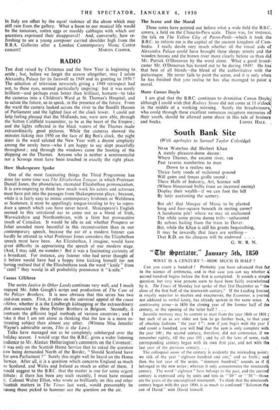RADIO
THE dust raised by Christmas and the New Year is beginning to settle ; but, before we forget the season altogether, may I salute Alexandra Palace for its farewell to 1949 and its greeting to 1950 ? The selection of television newsreels giving a 1949 retrospect had not, to these eyes, seemed particularly inspiring: but it was surely brilliant—and perhaps even better than brilliant, humane—to take the cameras into a Children's Ward at St. Thomas's Hospital, and to salute the future, so to speak, in the presence of the future. From the ward the camera looked across the river to the floodlit Houses of Parliament and the lighted face of the clock tower. I could pot help feeling pleased that the Midlands, too, were now able, through the Sutton Coldfield transmitter, to be at the heart of the Empire ; and the lights reflected in the black waters of the Thames made extraordinarily good pictures. While the cameras showed the minutes ticking into 1950 on the face of Big Ben's clock, the night sister in the ward saluted the New Year with a decent simplicity among the newly born—who I am happy to say slept peacefully throughout ; and through the windows came the hooting of the shipping on the Thames. Anyone who is neither a sentimentalist nor a Scrooge must have been touched in exactly the right place.
How Shakespeare Spoke One of the most fascinating things the Third Programme has done for some time was The Elizabethan Tongue, in which Professor Daniel Jones, the phonetician, recreated Elizabethan pronunciation. It is awe-inspiring to think how much work his actors and actresses must have put into the passages from Shakespearean plays ; because, while it is fairly easy to mimic contemporary Irishmen or Welshmen or Scotsmen, it must be appallingly tongue-twisting to try to repro- duce a speech which you have never heard. Shakespeare's English seemed to this untutored ear to come out as a blend of Irish, Warwickshire and Northumbrian, with a faint but provocative touch of Canadian. It would be idle to ask whether Prospero or Juliet sounded more beautiful in this reconstruction than in our contemporary speech, because the ear of a modern listener can hardly be attuned to what Professor Jones considers the Elizabethan speech must have been. An Elizabethan, I imagine, would have great difficulty in appreciating the speech of our modern stage. (And, I may add, no wonder.) But it was a fascinating curiosity of a broadcast. For instance, any listener who had never thought of it before wpuld have had a happy time kicking himself for not having realised that if the Elizabethans took the word " knife " from " canif " they would in all probability pronounce it " k-nife."
Causes Celebres The series Justice in Other Lands continues very well, and I much enjoyed Mr. John Gough's script and production of The Case of the Peltzer Brothers. It is now obvious that this series has two cast-iron assets. First, it relies on the universal appeal of the cause célebre, whether it is the Lindbergh kidnapping or the extraordinary plot concocted by these Peltzer Brothers in Belgium. Secondly, it contrasts the different legal methods of various countries ; and I take it that I am not alone in thinking that the law is a more in- teresting subject than almost any other. (Witness Miss Jennifer Wayne's admirable series, This is the Law.) Talks have managed not to be completely subtherged over the holiday season. I would urge that the B.B.C. gives a wider listening
audience to Mr. Alastair Hetherington's comments on the Covenant: it was only on the Scottish Home Service that he asked the question now being demanded North of the Border, " Should Scotland have her own Parliament ?" Surely this might well be heard on the Home Service. After all, it is a question which concerns England as much as Scotland, and Wales and Ireland as much as either of them. I would suggest to the B.B.C. that the matter is one for some urgent debate: if there has been any such recently, I must have missed it. Colonel Walter Elliot, who wrote so brilliantly on this and other Scottish matters in The Times last week, would presumably be among those picked to hammer out the question on the air. These notes have pointed out before what a wide field the B.B.C. covers, a field on the China-to-Peru scale. There was, for instance, the talk on The Yellow City of Pnom-Penh—which it took the B.B.C. to inform me is the capital of the ancient kingdom of Cam- bodia. I really doubt very much whether all the visual aids of Alexandra Palace could have brought these sleepy streets and the wooden houses and the brown river more clearly before us than did Mr. Patrick O'Donovan by the word alone. What a good broad, caster Mr. O'Donovan has turned out to be during 1949! He has that best of all blends—the blend of the authoritative with the picturesque. He never fails to paint the scene, and it is only when he has finished that you realise he has also managed to point a: moral.
More Conan Doyle I am glad that the B.B.C. continues to dramatise Conan Doyle) although I could wish that Rodney Stone did not come at 11 o'cloc in the middle of a working morning. Surely the breadwinners who could through these excellent romances recapture memories oil their youth, should be allowed some share in this tale of bruisers






































 Previous page
Previous page